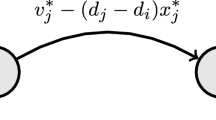Abstract
In this paper, we study the sensitivity of the optimum of the knapsack problem to the perturbation of the profit of a subset of items. We propose a polynomial heuristic in order to establish both lower and upper bound limits of the sensitivity interval. The aim is to stabilize any given optimal solution obtained by applying any exact algorithm. We then evaluate the effectiveness of the proposed solution procedure on an example and a set of randomly generated problem instances.
Similar content being viewed by others
References
Belgacem, T. & Hifi, M. (2006). Analyse de la sensibilité de l’optimum pour le problème du knapsack: perturbation de plusieurs profits. 7-ième Congrés de la ROADEF, Lille, France
Belgacem, T. & Hifi, M. (2007). Sensitivity analysis of the optimum to perturbation of the profit of a subset of items in the binary knapsack problem. Working Paper, CES, Equipe CERMSEM, Université Paris 1, France
Belgacem, T. & Hifi, M. (2008). Sensitivity analysis of the knapsack sharing problem: perturbation of the weight of an item. Computers and Operations Research, 35: 295–308
Blair, C. (1998). Sensitivity analysis of knapsack problems: a negative result. Discrete Applied Mathematics, 81: 133–139
Dantzig, G.B. (1957). Discrete variable extremum problems. Operations Research, 5: 266–277
Ghosh, D., Charkravarti, D. & Sierksma, G. (2006). Sensitivity analysis of a greedy heuristic for knapsack problems. European Journal of Operational Research, 169: 340–350
Gilmore, P.C. & Gomory, R.E. (1966). The theory and computation of knapsack functions. Operations Research, 13: 879–919
Greenberg, H.J. (1998). An annotated bibliography for post-solution analysis in mixed integer programming and combinatorial optimization. In: Woodruff D.L. (eds.), Advances in Computational and Stochastic Optimization, Logic Programming, and Heuristic Search, pp. 97–148. Kluwer Academic Publishers
Hifi, M., Mhalla, H. & Sadfi, S. (2005). Sensitivity of the optimum to perturbations of the profit or weight of an item in the binary knapsack problem. Journal of Combinatorial Optimization, 10: 239–260
Hifi, M., Mhalla, H. & Sadfi, S. (2004). Adaptive algorithms for the knapsack problem: perturbation of an arbitrary item. Working Paper, CERMSEM-CNRS UMR 8095, MSE, Université Paris 1
Kellerer, H., Pferschy, U. & Pisinger, D. (2004). Knapsack Problems. Springer Verlag, Berlin
Martello, S. & Toth, P. (1977). An upper bound for the zero-one knapsack problem and a branch and bound algorithm. European Journal of Operational Research, 1: 169–175
Nauss, R. (1979). Parametric Integer Programming. University of Missouri Press, Columbia, Missouri
Pisinger, D. (1999). Core problems in knapsack algorithms. Operations Research, 47: 570–575
Woeginger, G.J. (1999). Sensitivity analysis for knapsack problems: another negative result. Discrete Applied Mathematics, 92: 247–251
Author information
Authors and Affiliations
Corresponding author
Additional information
The original version was presented on ICSSSM’06. The authors are listed in alphabetical order.
Mhand Hifi is Professor of Computer Science and Operations Research in the University of Picardie Jules Verne, Amiens, France. He got his B.S. in Computer Engineering and Operations Research from USTHB, Algiers, Algeria. He got his M.S. in Modelling and Mathematical Methods in Economics from the University of Paris 1 Pantheon-Sorbonne. He got his Ph.D. in Computer Science from the University of Paris 1 and his HDR thesis from the University of Versailles St Quentin en Yvelines. His research interest is NP Hard combinatorial optimization (sequential and parallel approaches) applied to cutting, packing, knapsacking and other OR problems.
Tarik Belgacem got his PhD in Computer Science from the University of Paris 1 Pantheon-Sorbonne. He received his B.S. in Mathematics at the University of Mostaganem, Algeria. He got his M.S. in Discrete Mathematics and Computer Science from the University of Paris 1 Panteon-Sorbonne. His research interest is Combinatorial Optimization.
An erratum to this article can be found online at http://dx.doi.org/10.1007/s11518-008-5089-3.
Rights and permissions
About this article
Cite this article
Belgacem, T., Hifi, M. Sensitivity analysis of the knapsack problem: Tighter lower and upper bound limits. J. Syst. Sci. Syst. Eng. 17, 156–170 (2008). https://doi.org/10.1007/s11518-008-5073-y
Published:
Issue Date:
DOI: https://doi.org/10.1007/s11518-008-5073-y




